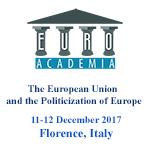Euroacademia Conferences
 Europe Inside-Out: Europe and Europeanness Exposed to Plural Observers (9th Edition) April 24 - 25, 2020
Europe Inside-Out: Europe and Europeanness Exposed to Plural Observers (9th Edition) April 24 - 25, 2020 Identities and Identifications: Politicized Uses of Collective Identities (9th Edition) June 12 - 13, 2020
Identities and Identifications: Politicized Uses of Collective Identities (9th Edition) June 12 - 13, 2020 8th Forum of Critical Studies: Asking Big Questions Again January 24 - 25, 2020
8th Forum of Critical Studies: Asking Big Questions Again January 24 - 25, 2020 Re-Inventing Eastern Europe (7th Edition) December 13 - 14, 2019
Re-Inventing Eastern Europe (7th Edition) December 13 - 14, 2019 The European Union and the Politicization of Europe (8th Edition) October 25 - 26, 2019
The European Union and the Politicization of Europe (8th Edition) October 25 - 26, 2019 Identities and Identifications: Politicized Uses of Collective Identities (8th Edition) June 28 - 29, 2019
Identities and Identifications: Politicized Uses of Collective Identities (8th Edition) June 28 - 29, 2019 The European Union and the Politicization of Europe (7th Edition) January 25 - 26, 2019
The European Union and the Politicization of Europe (7th Edition) January 25 - 26, 2019 7th Forum of Critical Studies: Asking Big Questions Again November 23 - 24, 2018
7th Forum of Critical Studies: Asking Big Questions Again November 23 - 24, 2018 Europe Inside-Out: Europe and Europeanness Exposed to Plural Observers (8th Edition) September 28 - 30, 2018
Europe Inside-Out: Europe and Europeanness Exposed to Plural Observers (8th Edition) September 28 - 30, 2018 Identities and Identifications: Politicized Uses of Collective Identities (7th Edition) June 14 - 15, 2018
Identities and Identifications: Politicized Uses of Collective Identities (7th Edition) June 14 - 15, 2018
Paris as a Scenery of Rebelliousness During the Inter-War Period (1918-1933)
-
-

-
Presentation speakers
- Andrea Victoria Russo, UBA / IDAES- UNSAM/ Jagiellonian University
- Download presentation
Abstract:
Beetween 1914 and 1918, the Great War took place. Several writers analized the European society as “decadent and sick”, being that World War I meant a breaking point when it comes to the political and social systems that were considered representative of the European society. The democratic and capitalist systems, main elements of the liberal society were left behind, and as a consecuence, they hit a crisis. The decades after the War saw the development of a new society that was different from the bourgeois society, that tok place from the XIX century until the break of the War. The Great War simbolised the crystallization of the social, economical and political changes and these changes were known by writers as the crisis of the middle class consciousness, or crisis of the bourgeois society. At the same time, Paris became the meeting point of different artistic and literary movements that represented new perspectives. To a new generation of young men, the war meant the beginning of an era, signed by the deception of the liberal society that were the origine of that war. This Generation of writers, such as Ernest Hemingway, Gertrude Stein and Francis Scott Fitzgerald give a portrait in their work of a new way to see the European Society, and so Paris became the scenery where this new Generation of writers give a main role to the rebelliousness, as an ethos that becomes the heart of the literary production of the decade. In this paper, my goal is to travel through the hurted city of Paris during the ’20s, a citiy represented by writers, for whom Gertrude Stein´s house, the cafes, the Quartier Latin and Les Jardines du Luxembourg became characters of their novels.
-
Related Presentations

Politicizing Europe: Normative Conditionality in the EU Institutions’ Interpretations of Europe(-anness)
- Annie Niessen

Populist Tribes: Protest Voting as a Collective Action
- Carlo Altomonte
- Gloria Gennaro













